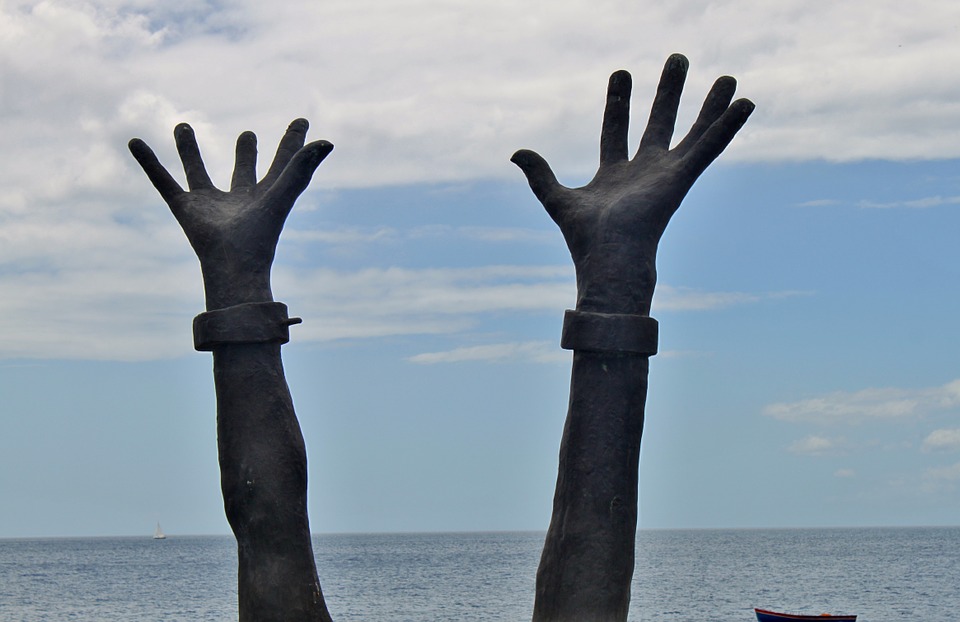


I have been thinking a lot about Hagar (Genesis 16: 1-15; 21:1-21) lately. Just a quick review of the traditional Sunday School corpus identifies Hagar has the woman who bore Ishmael, the son of Abram (later Abraham), who was married to Sarai (later Sarah). There is quite a bit of her story that resonates with the Black female experience in America: she was a single mother, she was a slave, she was a woman of African descent, and she was a woman with little control over who got to use her body or her labor.
Now that I have gotten caught up on the WGN television show “Underground,” (be advised, spoilers are coming!), I can see similarities between biblical Hagar and the character of Ernestine, brilliantly played by Amirah Vann. Ernestine is a slave on the Macon Plantation who works in the big house. Like Hagar, she has children by her slaveholder (I just hate using the word “master”) and also has conflict with the slaveholder’s wife, Suzanna. Suzanna and Sarai have a few things in common as well: they both deeply resent and act out against the living evidence of their husbands’ relationships with the women they own. In theory, neither Hagar nor Ernestine have the agency to say no to Abram’s or Tom’s sexual advances, because they are considered property.
Just a cursory review of the practices of American slaveholders would quickly disclose that many of them had sexual relationships with their slaves, whether seemingly consensual in the case of the “Underground” character of Ernestine, who appears to use sex to manipulate Tom Macon (who clearly has feelings for her), or by forcibly raping female slaves in order to gain “free” labor. One thing is clear about Ernestine: whether or not she enjoyed her sexual relationship with Macon is not the point…the point is that she was able to seize a small measure of power for herself and her children through it.
In Hagar’s case, ancient law codes stipulated that if a wife unable to bear children, and not eager for her husband to take another wife, an option would be the purchase a ‘slave-girl’ to bear children on her behalf. In contemporary Christian education, Hagar is often presented as a surrogate mother for Sarai and/or a concubine for Abram with little attention given to how Hagar may have felt about the whole thing. There is nothing in Genesis 16 or 21 that suggests that Hagar was okay with any of this. And now she has a son that Sarai resents her having, despite her initial plan of providing an heir for Abram through her.
When Black women began enrolling in graduate degree programs in religion and entering seminaries in order to formally teach the Bible or preach the Bible (or both), they recognized the value in recovering the voice of Hagar in order to discuss the negative effects of reproductive and economic exploitation on contemporary Black women, and this bounty was glorious. Whether you are reading Hagar as part of resistance literature or for a Women’s Day service, there is a piece to Hagar’s story we should not miss:
6But Abram said to Sarai, “Your slave-girl is in your power; do to her as you please.” Then Sarai dealt harshly with her, and she ran away from her. 7The angel of the Lord found her by a spring of water in the wilderness, the spring on the way to Shur. 8And he said, “Hagar, slave-girl of Sarai, where have you come from and where are you going?” She said, “I am running away from my mistress Sarai.” 9The angel of the Lord said to her, “Return to your mistress, and submit to her.” 10The angel of the Lord also said to her, “I will so greatly multiply your offspring that they cannot be counted for multitude.” (Genesis 16: 6-10, NRSV)
Apparently, Sarai’s treatment of Hagar was so bad, she ran away. But even that is not the worst of it! The angel of the Lord tells her to go back. What in the name of Harriet Tubman does that even mean? And what does it say about the God we serve? Is God co-signing her oppression? Why didn’t the angel tell Hagar to a) keep going; or b) offer to fight for her?
This is one of those times when we must truly wrestle with what the text says, peeling back the layers beyond what appears at the surface. Surely God is not okay with Hagar’s mistreatment. Right?
If this were a Bible study, this would be that moment when everyone gets real quiet. But I believe that is exactly what God intended. God intends for us to wrestle with the words of the Bible and their meaning. Even the ancient people of Israel struggled with God’s meaning and intent; just read through the Psalms. The Psalms are a living, breathing bible study about their attempt to find theological meaning in ways that helped to make sense of their current circumstances. I would apply that same school of thought here.
Maybe Hagar was being sent back to Sarai and Abram because she needed to find her worth in a situation that deemed her worthless. I will just go ahead and pull the pin on this grenade: how many women of color have incredibly low self-esteem to the extent they don’t even believe what God says about them? I’m not saying we don’t have ample reason to feel a little insecure about ourselves considering the world we live in. What I am saying is that too many of us believe in God without believing God. We don’t see ourselves as worthy of love, not from God or even our own selves. I think self-love is particularly hard for women; so much of what is lauded about us has to do the sacrifices a woman make for other people: for her children, for her spouse, for her church. Women in church are often encouraged to remain in the shadows and allow the much fewer in number men of the congregation to be great. Why is that?
Hagar gives us permission to live…to live in our circumstances despite all hell breaking loose. One of the greatest fallacies of the Christian walk is the belief that being a Christian should somehow shield us from calumny and chaos. It doesn’t. Being a Christian means you have the promise of God’s presence as you go through calumny and chaos. Hagar’s story does not end like a Disney movie. But she did have God’s promise of presence for her and her son.
Hagar’s story also reminds us that we may find ourselves in irredeemable situations. People who believe in God end up experiencing and catching hell on the regular; just look how Ernestine’s story ended on the season finale of “Underground.” There was no rescue, no ‘knight in shining armor’ for Ernestine or Hagar. What do we do with God’s perceived unfairness? Why do we even have this expectation of a ‘fair’ life? I think one takeaway from the Hagar’s story is this: if and when God’s answer is no, you can’t leave this situation right now…can you live?